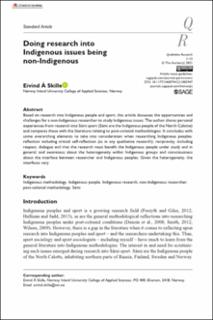| dc.contributor.author | Skille, Eivind Å | |
| dc.date.accessioned | 2021-12-07T09:07:34Z | |
| dc.date.available | 2021-12-07T09:07:34Z | |
| dc.date.created | 2021-05-03T14:55:49Z | |
| dc.date.issued | 2021 | |
| dc.identifier.citation | Qualitative Research. 2021, 1-15. | en_US |
| dc.identifier.issn | 1468-7941 | |
| dc.identifier.uri | https://hdl.handle.net/11250/2833043 | |
| dc.description.abstract | Based on research into Indigenous people and sport, this article discusses the opportunities and challenges for a non-Indigenous researcher to study Indigenous issues. The author shares personal experiences from research into Sámi sport (Sámi are the Indigenous people of the North Calotte) and compares these with the literature relating to post-colonial methodologies. It concludes with some overarching elements to take into consideration when researching Indigenous peoples: reflection including critical self-reflection (as in any qualitative research); reciprocity, including respect, dialogue and that the research must benefit the Indigenous people under study and in general; and awareness about the heterogeneity within Indigenous groups and consciousness about the interface between researcher and Indigenous peoples. Given the heterogeneity, the interfaces vary | |
| dc.language.iso | eng | en_US |
| dc.rights | Navngivelse-Ikkekommersiell 4.0 Internasjonal | * |
| dc.rights.uri | http://creativecommons.org/licenses/by-nc/4.0/deed.no | * |
| dc.title | Doing research into Indigenous issues being non-Indigenous | en_US |
| dc.type | Peer reviewed | en_US |
| dc.type | Journal article | en_US |
| dc.description.version | publishedVersion | |
| dc.source.pagenumber | 1-15 | en_US |
| dc.source.journal | Qualitative Research | en_US |
| dc.identifier.doi | 10.1177/14687941211005947 | |
| dc.identifier.cristin | 1907813 | |
| cristin.ispublished | true | |
| cristin.fulltext | original | |
| cristin.qualitycode | 2 | |

